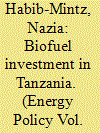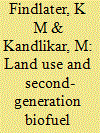|
|
|
Sort Order |
|
|
|
Items / Page
|
|
|
|
|
|
|
| Srl | Item |
| 1 |
ID:
097209


|
|
|
|
|
| Publication |
2010.
|
| Summary/Abstract |
Increasing demand for biofuels as a component of climate change mitigation, energy security, and a fossil fuel alternative attracts investors to developing countries like Tanzania. Ample unused land is critical for first generation biofuels production and an important feature to attract foreign direct investments that can contribute towards agricultural modernization and poverty reduction initiatives. Despite the economic justifications, the existing institutional and infrastructural capacities dictate the impacts of biofuels market penetrations. Furthermore, exogenous factors like global recessionary pressure depressed oil prices below the level at which biofuel production were profitable in 2007, making Tanzania's competitiveness and potential benefits questionable.
This paper investigates the extent that first generation, jatropha-based biofuels industry development in Tanzania observed during fieldwork in Kisarawe and Bahi may fulfill policy objectives. This paper argues that without strong regulatory frameworks for land, investment management, and rural development, biofuel industrialization could further exacerbate poverty and food insecurity in Tanzania. The paper concludes with policy recommendations for first generation biofuel development while keeping in mind implications of second generation production. Since the topic is broad and multifaceted, a multidisciplinary approach is used that includes political, institutional, and agricultural economics to analyze and conceptualize biofuel industry development and food security.
|
|
|
|
|
|
|
|
|
|
|
|
|
|
|
|
| 2 |
ID:
111382


|
|
|
|
|
| Publication |
2012.
|
| Summary/Abstract |
Jatropha, a non-edible oil seed yielding plant has been identified by the Government of India to produce biodiesel under National Biodiesel Mission. Failure of phase-I of National Biodiesel Mission and likely failure of phase-II requires critical analysis of policy frameworks related to its long term sustainability. Indian biofuel promotion policies like Biodiesel Purchase Policy and National Biofuel Policy have failed to yield any visible results. No tangible ground work is visible as of now to ensure success of various government plans and policies related to adoption of jatropha biodiesel. It is clearly evident that some serious bottlenecks are delaying the adoption of jatropha biodiesel. Present work identifies important policy bottlenecks like availability of land, non-remunerative pricing policy and state fear relating to loss of revenue in the case of zero duty regimes. This paper attempts to explore and critically analyze present policies and possible options taking into account the recent Indian experiences for successful adoption of jatropha biodiesel.
|
|
|
|
|
|
|
|
|
|
|
|
|
|
|
|
| 3 |
ID:
109605


|
|
|
|
|
| Publication |
2011.
|
| Summary/Abstract |
The paper investigates greenhouse gas (GHG) emissions from land use change associated with the introduction of large-scale Jatropha curcas cultivation on Miombo Woodland, using data from extant forestry and ecology studies about this ecosystem. Its results support the notion that Jatropha can help sequester atmospheric carbon when grown on complete wastelands and in severely degraded conditions. Conversely, when introduced on tropical woodlands with substantial biomass and medium/high organic soil carbon content, Jatropha will induce significant emissions that offset any GHG savings from the rest of the biofuel production chain. A carbon debt of more than 30 years is projected. On semi-degraded Miombo the overall GHG balance of Jatropha is found to hinge a lot on the extent of carbon depletion of the soil, more than on the state of the biomass. This finding points to the urgent need for detailed measurements of soil carbon in a range of Miombo sub-regions and similar tropical dryland ecosystems in Asia and Latin America. Efforts should be made to clarify concepts such as 'degraded lands' and 'wastelands' and to refine land allocation criteria and official GHG calculation methodologies for biofuels on that basis.
|
|
|
|
|
|
|
|
|
|
|
|
|
|
|
|
| 4 |
ID:
105758


|
|
|
|
|
| Publication |
2011.
|
| Summary/Abstract |
Governments around the world see biofuels as a common solution to the multiple policy challenges posed by energy insecurity, climate change and falling farmer incomes. The Indian government has enthusiastically adopted a second-generation feedstock - the oilseed-bearing shrub, Jatropha curcas - for an ambitious national biodiesel program. Studies estimating the production capacity and potential land use implications of this program have typically assumed that the 'waste land' slated for Jatropha production has no economic value and that no activities of note will be displaced by plantation development. Here we examine the specific local impacts of rapid Jatropha plantation development on rural livelihoods and land use in Rajasthan, India. We find that in Jhadol Tehsil, Jatropha is planted on both government and private land, and has typically displaced grazing and forage collection. For those at the socioeconomic margins, these unconsidered impacts counteract the very benefits that the biofuel programs aim to create. The Rajasthan case demonstrates that local land-use impacts need to be integrated into decision-making for national targets and global biofuel promotion efforts.
|
|
|
|
|
|
|
|
|
|
|
|
|
|
|
|
| 5 |
ID:
121269


|
|
|
|
|
| Publication |
2013.
|
| Summary/Abstract |
This study examines the Jatropha adoption process in Sarawak, Malaysia, a land rich in biological and ethnic diversity, but highly impoverished. Attempts to alleviate poverty through oil palm plantation development resulted in internationally condemned destruction of peat lands. Sarawak subsequently turned to the inedible, low-input, exportable, biodiesel feedstock Jatropha. This case study argues that Jatropha is unlikely to make more significant socio-economic contributions than oil palm or other cash crops. The analysis suggests that companies use social capital to aggressively expand their Jatropha business among the native population in order to gain access to native customary lands, which are often underproductive peat lands. Global biofuels sector development dynamics are examined through the lenses of political economics and social, agricultural, and energy studies. The research finds that farmers' decisions to participate in the biofuels global value chain may result in negative income effects, household food security reduction, and biodiversity loss from peat land destruction. The paper concludes with a proposal for an alternative approach to evaluate both social and financial drivers in order to prevent the negative effects of biofuel-based agribusiness on human and environmental systems.
|
|
|
|
|
|
|
|
|
|
|
|
|
|
|
|
| 6 |
ID:
171401


|
|
|
|
|
| Summary/Abstract |
Several countries across sub-Saharan Africa have promoted industrial crops to boost rural development, including rural energy poverty alleviation. However, little evidence exists about the intersection of rural development and energy poverty in industrial crop settings. We undertake a household survey to explore multidimensional energy poverty patterns around three operational industrial crop projects in Ghana (oil palm, jatropha, sugarcane). We conduct 850 surveys with households with different involvement in these projects (e.g. plantation workers, smallholders), as well as household not involved (i.e. control groups). Overall, distinct patterns emerge between sites and groups, reflecting the different area, project and household characteristics. Jatropha and oil palm plantation workers register lower energy poverty levels than their respective control groups, while oil palm and sugarcane smallholders register either the same (or higher) energy poverty. This is largely because income from engagement in industrial crop activities can reduce energy poverty for some groups, but only where modern energy options are readily available. In reality, other factors can be equally important, including other livelihood activities (e.g. sugarcane/palm oil processing) and the gender of household head. Such distinct patterns and local dynamics must be understood when aiming to achieve positive energy poverty alleviation outcomes through industrial crop expansion.
|
|
|
|
|
|
|
|
|
|
|
|
|
|
|
|
| 7 |
ID:
121385


|
|
|
|
|
| Publication |
2013.
|
| Summary/Abstract |
Following up the rather sobering results of the biofuels boom in Tanzania, we analyze the preconditions that would make large-scale oil production from the feedstock Jatropha curcas viable. We do this by employing an economic land evaluation approach; first, we estimate the physical land suitability and the necessary inputs to reach certain amounts of yields. Subsequently, we estimate costs and benefits for different input-output levels. Finally, to incorporate the increased awareness of sustainability in the export sector, we introduce also certification criteria. Using data from an experimental farm in Kilosa, we find that high yields are crucial for the economic feasibility and that they can only be obtained on good soils at high input rates. Costs of compliance with certification criteria depend on site specific characteristics such as land suitability and precipitation. In general, both domestic production and (certified) exports are too expensive to be able to compete with conventional diesel/rapeseed oil from the EU. Even though the crop may have potential for large scale production as a niche product, there is still a lot of risk involved and more experimental research is needed.
|
|
|
|
|
|
|
|
|
|
|
|
|
|
|
|
| 8 |
ID:
109365


|
|
|
|
|
| Publication |
2011.
|
| Summary/Abstract |
This paper provides insights and recommendations for policy on the opportunities and constrains that influence the space for innovation for sustainable community-based biofuel production and use. Promoted by the Mozambican government, Nhambita community established jatropha trials in 2005. Initial results were promising, but crop failure and the absence of organized markets led to scepticism amongst farmers.
We start from the idea that the promotion of community-based biofuel production and use requires taking interactions between social-cultural, biophysical, economic, political and legal subsystems across different scales and levels of analysis through time into account. Our analysis demonstrates that heterogeneous farming strategies and their synergies at community level should be carefully assessed. Furthermore, national and international political and legal developments, such as the development of biofuel sustainability criteria, influence the local space in which community-based biofuel developments take place.
We conclude that ex-ante integrated assessment and creating an enabling environment can enhance space for sustainable community-based biofuel production and use. It may provide insights into the opportunities and constraints for different types of smallholders, and promote the development of adequate policy mechanisms to prevent biofuels from becoming a threat rather than an opportunity for smallholders.
|
|
|
|
|
|
|
|
|
|
|
|
|
|
|
|
|
|
|
|
|